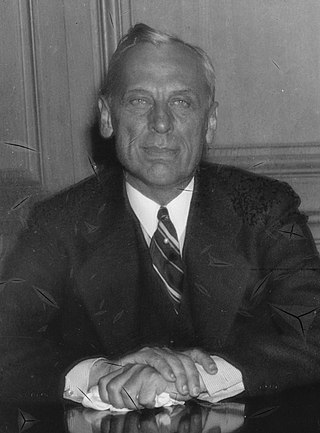Related Research Articles

Alfred Pritchard Sloan Jr. was an American business executive in the automotive industry. He was a long-time president, chairman and CEO of General Motors Corporation. Sloan, first as a senior executive and later as the head of the organization, helped GM grow from the 1920s through the 1950s, decades when concepts such as the annual model change, brand architecture, industrial engineering, automotive design (styling), and planned obsolescence transformed the industry, and when the industry changed lifestyles and the built environment in America and throughout the world.

System dynamics (SD) is an approach to understanding the nonlinear behaviour of complex systems over time using stocks, flows, internal feedback loops, table functions and time delays.

The MIT Sloan School of Management is the business school of the Massachusetts Institute of Technology, a private university in Cambridge, Massachusetts. MIT Sloan offers bachelor's, master's, and doctoral degree programs, as well as executive education. Its degree programs are among the most selective in the world. MIT Sloan emphasizes innovation in practice and research. Many influential ideas in management and finance originated at the school, including the Black–Scholes model, the Solow–Swan model, the random walk hypothesis, the binomial options pricing model, and the field of system dynamics. The faculty has included numerous Nobel laureates in economics and John Bates Clark Medal winners.

Jay Wright Forrester was a pioneering American computer engineer and systems scientist. He is credited with being one of the inventors of magnetic core memory, the predominant form of random-access computer memory during the most explosive years of digital computer development. It was part of a family of related technologies which bridged the gap between vacuum tubes and semiconductors by exploiting the magnetic properties of materials to perform switching and amplification.

Information management (IM) is the appropriate and optimized capture, storage, retrieval, and use of information. It may be personal information management or organizational. IM for organizations concerns a cycle of organizational activity: the acquisition of information from one or more sources, the custodianship and the distribution of that information to those who need it, and its ultimate disposal through archiving or deletion.

The MIT Sloan Management Review is a research-based magazine and digital platform for business executives published at the Massachusetts Institute of Technology. The print edition is published quarterly; the digital edition is updated daily.
John David Sterman is the Jay W. Forrester Professor of Management, and the current director of the MIT System Dynamics Group at the MIT Sloan School of Management. He is also co-faculty at the New England Complex Systems Institute. He is mostly considered as the current leader of the System Dynamics school of thought. He is the author of Business Dynamics: Systems Thinking and Modeling for a Complex World.

Thomas W. Malone is an American organizational theorist, management consultant, and the Patrick J. McGovern Professor of Management at the MIT Sloan School of Management.

Stuart E. Madnick is an American computer scientist, and professor of information technology at the MIT Sloan School of Management and the Massachusetts Institute of Technology school of engineering. He is the director of Cybersecurity at MIT Sloan (CAMS), formerly called the MIT Interdisciplinary Consortium for Improving Critical Infrastructure Cybersecurity ( ³).
Michael John Earl is a British academic, Formerly Dean of Templeton College, Oxford, Pro-Vice-Chancellor of Oxford University, and Professor of Information Management in the University of Oxford, known for his work on strategic information systems planning.
An operating model is both an abstract and visual representation (model) of how an organization delivers value to its customers or beneficiaries as well as how an organization actually runs itself.
Barry Marshall Richmond was an American systems scientist, and former managing director of High Performance Systems, Inc (HPS), an organization providing software and consulting services to build the capacity of people to understand and improve the workings of dynamic systems. He is known as a leader in the field of systems thinking and system dynamics and for the development of the STELLA/iThink modelling environment for simulation.
Stephen J. Andriole is an American information technology professional and professor at Villanova University who has designed and developed a variety of interactive computer-based systems for industry and government, from positions in academia, government and industry.

Jeanne Wenzel Ross is an American organizational theorist and principal research scientist at MIT Sloan School of Management and the MIT Center for Information Systems Research (CISR), specializes in Enterprise Architecture, ICT and Management. She is known for her work on IT governance, and Enterprise architecture.
John Fralick (Jack) Rockart was an American organizational theorist, and Senior Lecturer Emeritus at the Center for Information Systems Research at the MIT Sloan School of Management.
Dale Louis Goodhue is an American Information systems researcher, and Professor Emeritus at the Management Information Systems Department of the University of Georgia, known for his work on enterprise systems and data management in large organizations.
Peter Weill is an Australian computer scientist and organizational theorist, Professor of Information Systems Research at the MIT Sloan School of Management, and chairman of the MIT Center for Information Systems Research (CISR).
The MIT Center for Information Systems Research (CISR) is a research center at the MIT Sloan School of Management founded in 1974. MIT CISR's research focuses on the use of information technology and management in complex organizations. Its mission is to "develop concepts and frameworks to help executives address the IT-related challenges of leading increasingly dynamic, global, and information-intensive organizations."

Richard Michael Locke is an American political scientist who is currently provost of Brown University, a position he has held since July 2015. Locke became Brown's fourth Provost in six years, after his predecessor, Vicki Colvin, announced her resignation after less than one year in the position. A scholar on labor rights and corporate social responsibility, he previously served as the Howard R. Swearer Director of the Watson Institute for International and Public Affairs at Brown, and the deputy dean of MIT's Sloan School of Management.

Dame Fiona Elizabeth Murray is the Associate Dean for Innovation at the MIT Sloan School of Management. She is a member of the Prime Minister of the United Kingdom's Council for Science and Technology.
References
- 1 2 3 Michael Scott Morton, Jay W. Forrester Professor of Management (Emeritus) Archived 22 December 2015 at the Wayback Machine at mitsloan.mit.edu. Accessed November 2013.
- ↑ Michael S. Scott Morton: Reflections of Decision Support Pioneers on dssresources.com. Accessed November 2013.
- ↑ Power, D.J. "A brief history of Decision Support Systems". DSSresources.com. Retrieved 13 April 2015.
- ↑ Scott Morton, Michael (1991). The Corporation of the 1990s . New York: Oxford University Press.
- ↑ Scott Morton, Michael (1995). Information Technology and the Corporation of the 1990s : Research Studies. Oxford University Press. ISBN 9780195361780.
- ↑ "Inventing the Organizations of the 21st Century". MIT Press. Retrieved 13 April 2015.